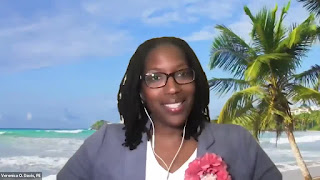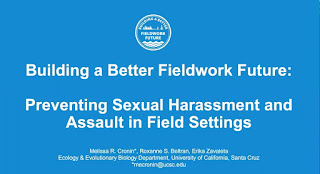By Rhia Henderson, Environmental Biology, MS ‘26
At the Women in STEM virtual
event Director of ESF Alumni
Relations, Debbie Caviness, interviewed four
successful ESF alumni who have established themselves in STEM fields about their advice and challenges
they’ve faced as women in STEM. This conversation took place on March 6, 2025,
with Billie Holecek ’20, Valerie Wiehl ’16, Emily Booth ’21, and Ally Berry
’19.
During this conversation Caviness
presented the alumnae
with a variety of questions
with a focus on the challenges that have overcome
as women in male dominated
STEM fields. Berry encouraged listeners
to “make space for themselves and find mentorship” which the other
speakers agreed with wholeheartedly. Another point of discussion was what the
speakers would give as advice to women thinking of pursuing STEM field and what
classes they had during their time at ESF that has supported them throughout their careers, to which each speaker gave complete and powerful responses from each of their
varied perspectives. The classes highlighted by each speaker were individual to
each of their majors, and included
Energy Markets and Policy, Remote Sensing, Python Coding, and Mycology to state
a few that the speakers noted as key classes that changed their perspectives. A
common theme for advice across the speakers was to find allies in each space,
maintain mentorship and networks, and to stand up for yourself (especially
during negotiations).
Billie Holecek
graduated from ESF in 2020 with a bachelor's in Sustainable Energy Management
and a minor in Applied Statistics and Energy and Environmental Policy.
She currently works for the Berkeley Lab as an Energy and Environmental Policy
Researcher while completing her masters in Energy and Environmental Policy at
University of Delaware.
Valerie Wiehl graduated from ESF in 2016 with a bachelor’s in Environmental Resources
and Engineering where she was
interested in engineering focused on water dynamics. In her professor career
she had landed in robotics
and now works as a Customer Success
Engineering Lead for Nightingale Security, using drones that respond to calls under emergency
circumstances.
Emily Booth graduated from ESF in
2021 with a bachelor’s in Forest Health where she worked with Dr. Dylan Parry on projects
surrounding biological control
methods. She now works for the city of Rochester as a Forestry Technician where
she manages 1/3 of the 65,000 trees in the city.
Ally Berry entered ESF as a
transfer student from Onondaga Community College and graduated in 2019 with a bachelor’s in Environmental Science
with a specialization in watershed science. She now works as an Environmental Project
Manager for LG Sonic US to monitor
and mitigate harmful
algal blooms around the US.
This discussion
was part of the Women in Scientific and Environmental Professions
(WiSE Professions) Speaker series
as a special installment for Women’s History
Month. It was presented jointly by the Alumni Association, Career
Services, Admissions, and ESF Women’s Caucus.
As part of the requirements for FOR 797, Perspective on Career and Gender students share responsibility of reporting on a subset of class discussions, including those that are part of the Women in Scientific and Environmental Professions Speaker Series (WiSE Professions).














